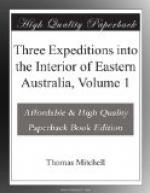“Les depenses utiles sont economie,” said Guibert, but in new countries the economy will much depend on the permanent utility of works for which, in most cases, the necessity should be foreseen. With the example of so many old countries for our guidance, obstructions to the spread of population in a new one should be removed, according to plans of general arrangement, keeping in view the best distribution of towns with respect to local advantages, and the best sites for all public buildings requisite for the towns still in embryo. The most advantageous general lines of direction should be ascertained for the roads—that the public means may be applied with certainty to their substantial improvement by removing obstructions and building bridges. On good roads there is greater inducement to individuals to erect inns; and in well arranged streets to build good houses—than where uncertainty as to the permanent direction of the one, or irregularity in the plan or line of the other, discourage all such undertakings.
It has been my duty to keep these objects in view as sole commissioner for the division and appropriation of the territory of New South Wales; and as head also of the department of roads and bridges I have, as far as lay in my power, applied the means at my disposal, only to works of a permanently useful character, guided as I have been in my judgment respecting them by a general survey of the country.
THE MOUNTAIN ROAD.
My ride along the mountain road presented no object worth describing; but I have frequently found that the most dreary road ceases to appear monotonous or long after we have acquired a knowledge of the adjacent country. The ideas of locality are no longer limited like our view by the trees on each side. The least turn reminds us that we are passing some antre vast, or lateral ridge, occupying a place in the map which thus determines our position. In crossing these mountains an extensive knowledge of the localities relieved the monotony of the road to me and, being inseparable from it in my mind, the digressions in this part of my journal will, after this explanation, perhaps appear less objectionable.
Twilight overtook me as I was giving directions to Subinspector Binning for the completion of the pass at Mount Victoria; and I halted for the night at a small inn at its foot.
April 2.
Although some heavy rain had fallen at Sydney and yesterday during my ride across the mountains yet the grass in this valley, which at other times had appeared green and abundant, was now parched and scanty. A swampy hollow across which a long bridge had been erected was quite dry, and the whole surface bore a brown and dusty aspect.
VALE OF CLYWD.
This lower country to which we had descended from Mount Victoria was named by Governor Macquarie the Vale of Clywd from its supposed resemblance to the valley of that name in Wales. It is enclosed by other heights named Mount York and Mount Clarence, and is watered by a small stream called the river Lett.*




